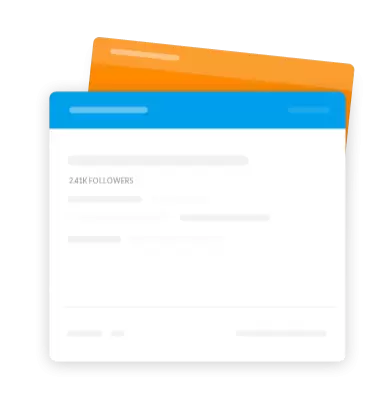- Google Ads and Facebook ads can work well together to help your ad campaigns.
- Google Ads is the most popular PPC advertising platform today. It also performs over 40,000 searches per second making it the ideal platform for search ads.
- Facebook has over 2 billion users on their site. You can use this platform to help your paid ad campaigns achieve higher granularity due to its platform and it’s social use.
In the tech world publicity machine, a lot has been made of the rivalry between Facebook and Google, particularly with their ad platforms. Tech rivalries make good stories, however in the case of Facebook ads vs Google Ads it’s a lot of hot air.

Source: Meme generator
Now that's a lot of hot air!
The two platforms have very different purposes and can be used together in a comprehensive marketing plan to have the best results. Let's find out how!
What are the features of Facebook and Google?
The search engine giant Google and the social media monolith Facebook (and Instagram) have very different uses. Google has a direct purpose for users, to find the answers, products or services they are looking for. It’s those users you are targeting when you run search ads on Google Ads (more on that later).
In contrast Facebook is a platform designed for casual, social use. A lot of Facebook uses put a lot of personal information on their profiles.
We know if someone is getting married, engaged, having a baby and other major life events. We know their interests and hobbies and can use this information for highly personalised ads that can lead to greater success (more on that later).
Both platforms allow for geolocation and times for their ads to run. But as you can see the rivalry doesn’t really exist as their users and in different frames of mind when using them.
What are the differences in strategy between Google and Facebook Ads in 2022/2022?
As I mentioned previously different users result in different campaign strategies when using the platforms.
Google is the most popular paid per click (PPC) advertising platform. Google Ads is commonly simply referred to as paid search. As it's really the best option around. If you’ve never run a paid search campaign in Google, here’s what’s involved:
- Paid search campaigns rely on the targeting of keywords that users search for when searching for a product, services or information.
- Keyword research is conducted in programs such as SEMRush and then you ‘bid’ for those keywords.
- You are then charged each time a user clicks on your ad.
- Your ad will usually be a simple text ad (there are image options, more on that later!) that will pop up in a search engine results page (SERP).
What paid search does is allow for ‘discovery’ of your product, alongside your customers needs, that they are searching for solutions for. You potentially have a massive audience to target that will find your product, due to Google having about 95% of search engine users.
The potential is huge.
Conversely Facebook paid ads are different in their format and how you target users. For starters an ad on Facebook must have visual elements as well as text and the targeting is far more complex than just keywords with paid search.
Your demographic options are vast in Facebook’s ad platform and you can target users without requiring them to lift a finger to find you. More is required in terms of visual elements and you may need a community manager to answer questions on your ad, however it’s targeting options are second to none for advertisers.
Now we have covered the basics required to understand the difference between Facebook Ads and Google Ads.
You can see that Google helps users who are looking for solutions and Facebook helps users find you.
Let's look a little closer into what exactly both platforms offer.
What does Google Ads really offer in terms of paid search?
When we are talking about paid search we are talking about using the Google Search Network. There is also the Google Display Network which you can read about here. For this article we stick to the search network.
- Google Ads offer a lot, especially for small businesses. The streamlined service and ease of use are major advantages over other platforms.
- The other major advantage of the Google Network is its way of creating a fairer system for all advertisers. In previous advertising markets, the larger the budget, the more likely you would secure the spot. Not, so with Google. Ad quality and relevance to the keywords are king here and this means that more effort has to be made finding relevant keywords and content to improve your quality score. The reason for this is simple: Google doesn't want users to be bombarded with irrelevant ads that annoy users. Quality ads = better user experience.
- In 2020 Google search ads gave the highest ROI of 1.55%. This is very likely due to relevancy and quality rankings being favoured over ad budgets.
- And let's not forget it has 95% of the search engine market!
It was previously mentioned that search ads are simple text ads. This is mostly true, but you can have other types of search ads with select images.
Through these ads you can book, plan your trip with Google Maps, place your products on Google shopping and more will be added with time. The sky's the limit!
Google Shopping has been a game changer for Google. Google shopping is when a visual ad (another type of visual ad in the search network) pops up when you search for a keyword targeted item. You can then go straight to the website to buy the item. It’s more visually detailed but usually limited to one photo.
.webp)
Source: Google Ads
The major benefit of Google Ads is it’s ease of use to the consumer and the advertiser. Now that you’ve learned more about Google Ads, let's get in depth about Facebook.
- Facebook Ads hasn’t been around as long but from its inception many tech insiders felt that it was in response to Google Ads. In truth, Facebook was always going to have an ads platform, it may have decided to delay it for many reasons.
- The social media giant is a big reason why social media is a core pillar of an advertising strategy in 2022. The reason for its popularity is simple, it works. Due to its high granularity, as previously mentioned, your target audience becomes very defined and as a result responsive.
- Another fantastic feature is the lookalike audience feature. This allows advertisers to upload information on their customers from their own databases and uses third party data to target similar audiences on Facebook. By doing this you effectively double your reach.
- We have previously mentioned that Facebook’s platform is inherently visual. This enables strong ad creative to do most of the talking. High resolution images and videos demonstrating your product are great for this platform.
- Last but definitely not least, Facebook has traditionally given high ROI when advertising on its platform. It doesn’t matter if you are running an awareness campaign or wanting app installs, the Facebook algorithm together with your targeting is a very successful combination. And like Google it doesn’t require a huge sum of money to get started. You can run a campaign for as low as $5 AUD a day. Not bad, huh? In the first quarter of 2020 Facebook ads gave an ROI of 1.11%. While it's not as high as Google, it was right behind. And in 2019 it was the highest ROI.
Comparatively speaking both ad platforms will give very high ROI due to their ability to target consumers personally due to search query or demographic granularity.
Can I run a paid ad campaign with Google Ads AND Facebook Ads?
Overwhelmingly, YES! It may not be suitable to run them at the same time but you can use search ads in an awareness campaign and then use Facebook ads in the conversion/ sales phase. However you can also run an awareness campaign on Facebook at the same time as your search ads if you wish. The exposure over the two networks can be huge.
It will also depend if your product or service is best as a visual campaign or as a simple text ad. It’s best to think of your campaign as what works best from an ad creative point of view and then evaluate the two platforms. There are always ways to make things work on both platforms.
Final Verdict
The final verdict? It really depends on your aims, product and where you are at in your digital marketing cycle. However both Facebook Ads and Google Ads are very effective for awareness, conversions and remarketing so you won't lose if you choose either one. My suggestion would be to start with Google ads for discovery and then run a paid social campaign to follow up. And you get amazing awareness, brand recognition if you use both! So what do you have to lose?
If you want to dive into the highly rewarding world of digital advertising with Google ads or Facebook ads, think about what you want for your ad in terms of images or text. Then contact a service vendor, like a creative agency to guide you through your first few campaigns!
An exciting world awaits!
Editor's Update
We hope this article has helped you understand more about which is the best advertising strategy for your business. Social media advertising can be challenging. If you still have some questions or want to learn more, head to our Social Media Advertising group to connect with social media advertising experts and other businesses.
Do you need help with
Adwords?
There are 338 AdWords & PPC agencies on standby





